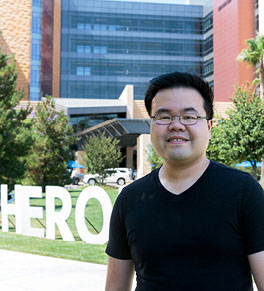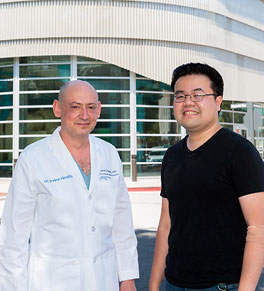Natural killer cells show potential to treat COVID-19 symptoms

COVID-19 was the last thing on Michael Nguyen’s mind on his combined business and leisure trip to Florida in March. He’d always been nonchalant about the pandemic and wasn’t vaccinated.
There, however, he noticed that no one wore masks and people were gathering in big groups. He remembers thinking, “If I was ever going to get it, it would be here.”
On the plane home, the 26-year-old Anaheim man had a gut feeling he’d caught it. When his dad picked him up at the airport, he sat in the back of the family van to be as far away as possible. Soon, he developed a sore throat. Three days later, he tested positive for COVID-19.
“For the first week, I had mild symptoms.” recalls Nguyen. “By the end of the second week, I couldn’t stand or walk by myself.”
On April 15, his brother drove him to UCI Medical Center, where he was hospitalized with a high fever and plummeting oxygen levels. The next morning, he had to be turned on his stomach to breathe. His doctors weighed treatment options, including a number of COVID-19 clinical trials.
Natural killer cells to the rescue
Nguyen was enrolled in a groundbreaking phase 1 clinical trial, a first-in-human study to evaluate the safety and potential efficacy of natural killer cells to treat patients with moderate COVID-19 disease.
Natural killer (NK) cells are a type of white blood cell and an integral component of the body’s immune system, says Dr. Leonid Groysman, assistant clinical director of the UCI Alpha Clinic and the study’s lead investigator. NK cells can contain viral infections while the body’s adaptive immune response generates T cells, another type of white blood cell, to clear the infection.
Until recently, most NK cell research has been focused on fighting cancer. Because natural killer cells are nonspecific, they are able to kill any invader. “This trial is exciting because NK cells could be effective in fighting any virus in the present and into the future,” explains Groysman, an associate professor of neurology at the UCI School of Medicine.
Groundbreaking trial
The clinical trial involves infusions of CYNK-001, NK cells formulated from human placental stem cells donated after birth. When activated, these infused cells secrete cytokines — small soluble proteins that give instructions and mediate communication among immune and nonimmune cells. Past studies have shown that they are toxic to solid tumor and blood cancer cells, as well as virally infected cells.
“The process is similar to giving a blood transfusion,” says Groysman. “We’re boosting the number of NK cells in a person’s body so they can better fight off the COVID-19 infection.”
Nguyen's treatment consisted of three CYNK-001 infusions given on the first, fourth and seventh days over a 10-day period. To be considered, trial participants had to be:
- Age 18 or older
- Have a confirmed COVID-19 diagnosis via PCR test
- Have moderate symptoms (i.e., not admitted to ICU or on a mechanical ventilator) and/or radiologic evidence of a lower respiratory tract infection
- Have oxygen saturation levels at or greater than 88% on room air; or at or over 92% on supplemental oxygen
“Michael was the perfect candidate,” Groysman says. “I had seen it work for four previous participants and we wanted to help him feel better quickly.”
Nguyen liked Groysman’s thorough explanation and the fact that he could quit the trial at any time.
“I have a master’s degree in statistics from Brown University, so I understand the importance of data points,” he says. “But really, I just wanted to help science and other people because of the exceptional care I was getting at UCI Health.”
A phenomenal result
Nguyen got his first CYNK-001 infusion the next day. “By the next morning, I could turn over, I could stand, I could walk around,” he says.
After the second infusion, Nguyen felt 90% better. When research coordinator Alexandria Murry checked on him, he tried to sing.
“She said, ‘COVID-19 might give you superpowers, but singing isn’t one of them,’” Nguyen laughingly recounts. “The treatments couldn’t solve my pitch problem, but it was amazing that I had enough lung power to sing at all after only four days.”
The day of his last infusion, his bloodwork revealed high liver enzymes, a common side effect of COVID-19 infection. Groysman consulted with other clinical trial physicians. After six hours of deliberation, they concluded it was safe to proceed because the liver enzymes were at a similar level when he was first admitted. Groysman left the ultimate decision to proceed up to his patient.
“I told him to go for it,” says Nguyen, “I felt completely safe in his hands. It also gave me a deeper appreciation of the gravity of the clinical trial, and that I wasn’t a number or research statistic to them.”
Uniquely positioned
The UCI Alpha Stem Cell Clinic was the first in the country to launch the CYNK-001 trial. As part of the UCI Sue and Bill Gross Stem Cell Research Center, it is uniquely positioned to conduct such research because stem cells require a vigorously controlled environment, storage and expertise.
Groysman says all five patients who participated in the clinical trial felt better the day after their first dose, adding that “we observed a trend toward improvements in oxygenation, inflammatory markers, radiographic findings and time to viral clearance.”
Celularity Inc. — the company that developed CYNK-001 and the trial's sponsor — is compiling the phase 1 results. But it will have to be tested successfully in many more COVID-19 patients to be considered for FDA approval.
“Still, it’s exciting because our patients improved so rapidly with no complications or adverse effects,” Groysman says. “With further study, I believe this treatment could keep moderately affected COVID-19 patients out of the ICU and off mechanical ventilation.”
A transformative, healing experience
Now symptom-free and back to full health, Nguyen is in talks to launch a startup — an app that would allow small businesses to process contactless payments using QR codes, even without a smartphone.
He encourages others to participate in clinical trials. And he calls the 10 days he spent at UCI Douglas Hospital recovering from COVID-19 a transformative and healing experience because of the care he received from everyone, physicians to nurses and even the custodial staff.
“After living through this, I do have to say that I’m sure there is a creator. The grace of God is found in other people,” he says. “Kindness and gratitude toward each other — those are the little miracles of life that we take for granted.”
The UCI Alpha Clinic is the clinical trials arm of the UCI Sue & Bill Gross Stem Cell Research Center (SCRC) and part of a network of the state's leading medical centers funded by the California Institute of Regenerative Medicine (CIRM). The ASCC specializes in delivering leading-edge stem cell clinical trials to patients and seeks to accelerate the development of treatments through partnerships with patients, medical providers and clinical trial sponsors. The ASCC network supports both CIRM-funded clinical trials and those funded by academic and industry sponsors. Visit www.stemcell.uci.edu to learn more about ASCC, clinical stem cell trials and regenerative medicine research at UCI.
Related stories
Explore Further
Browse more blog posts by topic.





